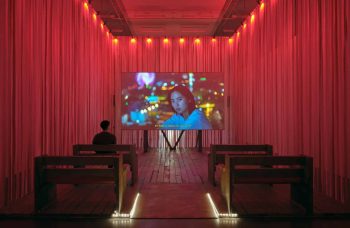The latest offering from visionary Korean director Park Can-Wook has been making a strong impression across the film festival circuit this year. Decision To Leave, a methodically slow burn of a tragic noir romance, has already picked up Best Director at the Cannes Film Festival, along with selections at the Toronto and Vancouver International Film Festivals. While this cerebral inversion of cat and mouse does differ from some of the stylized aspects of Park Chan-Wook’s other work, it asserts itself immediately as being from the same keen mind with its mastery of genre.
Park Chan-Wook is quite easily most known for his ultra-violent thriller Oldboy, a cult classic neo-noir that follows a man’s quest for vengeance after years as a captive amidst a web of conspiracies. The second of Park Chan-Wook’s films in his “Vengeance Trilogy”, Oldboy cemented him as a force in genre film as capable as the west’s Tarantino—the president of the Cannes Film Festival jury when Oldboy won the Grand Prix in 2004. He established himself as a precise and poignant writer, a meticulous director of mood, and a mind unafraid to tackle the most visceral subject matter in the most elegantly brutal manner.
Decision To Leave leaves behind a great deal of the darkness that made Park Chan-Wook so identifiable, yet his identity as a filmmaker still shines through in full. Following insomniac detective Hae-jun juggling cases on an urban beat, the married detective begins to develop feelings for Seo Rae, the widow and prime suspect of a murder he is currently investigating. As he falls for her, the reality of the situation comes to light, and Hae-jun’s life starts to come apart as he falls into a cycle of deception and abandonment of his station due to his infatuation with Seo Rae, and she begins to take any risk possible to be near him.
The pacing of Decision To Leave is searingly gradual, a slow burn that intensifies rather than grows. The rhythm of noir is clear and distinct, plodding and then galloping in perfect succession. Even in the quicker action sequences of the film—which are sparser decoration than a core concept—the weighty, near-dreamy stakes of Hae-jun’s conundrum are always present like a trench coat with too much history in its pockets.
Without a doubt, the most striking elements of the film are its audio-visual narrative devices. Hae-jun spends much of the plot staking out Seo Rae’s apartment, speaking into his smartwatch to record voice notes. In these moments we hear his voice at playback quality, and our detective is transported across space to wander the location, unseen, alongside Seo Rae. It’s a gorgeously captivating means of representing the core spiralling structure of the film—the inseparable knot of the intimacy of sleuthing with the intimacy of love.
Easily the strongest neo-noir of the last several years, Decision To Leave grapples with themes of disillusionment, obsession, love, and honour in the unflinching way that only Park Chan-Wook can. As brooding as it is beautiful, as haunting as it is heartfelt, Decision To Leave is a must-see for any fans of noir, Korean cinema, or a good old-fashioned heartbreaker.





